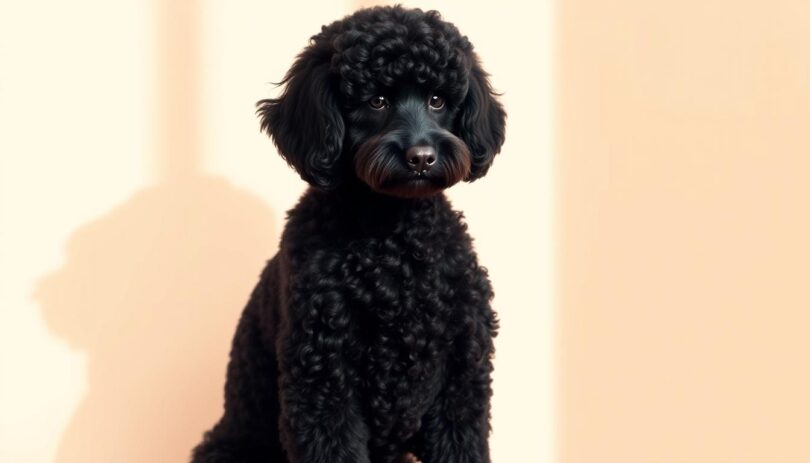Are you captivated by the elegance of the Black Poodle? You’re not alone. This stunning variation of the Poodle breed has won hearts with its sleek coat and charming demeanor. But there’s more to this dog than meets the eye.
While the term “Black Poodle” might suggest a distinct breed, it’s actually a color variation found across all Poodle sizes. From Toy to Standard, the black coat adds a touch of sophistication to this already intelligent and affectionate dog. In this guide, we’ll delve into everything you need to know about caring for your Black Poodle, including grooming, diet, and training tips.
Originally bred as working dogs, Poodles have evolved into beloved companions. Their intelligence and trainability make them a favorite for many. Whether you’re a seasoned owner or welcoming your first Poodle, this guide will serve as your go-to resource.
In the following sections, we’ll explore the history, appearance, and health of Black Poodles, ensuring you’re equipped with the knowledge to provide the best care for your furry friend.
The Legacy and Origin of the Black Poodle
Discover the fascinating history behind the Black Poodle, a breed steeped in tradition and elegance. Originating as water retrievers, Poodles have a disputed ancestry traced between Germany and France, with records dating back to the 14th century.
Historical Beginnings and Ancestry
The early Poodle was bred to excel in water, assisting hunters in retrieving game. Their natural aptitude in aquatic environments made them invaluable as working dogs. Over centuries, their role evolved from functional to companionship, becoming cherished by European nobility.
The Transition from Working Dog to Companion
Historical figures like Louis XIV played a significant role in popularizing Poodles as royal companions. Their intelligence and trainability made them ideal for this new role, fostering a deep bond with humans that persists today.
Human interaction refined the Poodle’s temperament, making them more suited as pets. This evolution from a working dog to a loyal companion highlights their adaptability and enduring appeal.
For more insights into caring for your Black Poodle, visit our guide on Mini Goldendoodle care to explore similar traits and care tips.
Exploring Black Poodle Appearance and Genetics
The allure of a Black Poodle’s coat is undeniable. Their fur is one of the most striking features, making them a favorite among dog enthusiasts.
Distinctive Coat Characteristics
Black Poodles boast a solid black outer coat, which can sometimes have a bluish or grayish inner layer. This unique combination gives their fur a multi-dimensional appearance. The texture of their coat is curly and non-shedding, a trait that requires regular grooming to prevent matting. This distinctive look contributes significantly to their charm and desirability as pets.
Genetic Traits Behind the Signature Black Fur
The black coloration in Poodles is primarily due to the dominance of the eumelanin pigment. This genetic trait ensures that the black color is prevalent and vibrant. Interestingly, even if neither parent is black, Black Poodle puppies can be born due to the genetic makeup inherited from ancestors. This highlights the strong influence of the eumelanin gene in determining their coat color.
While some Poodles may have mixed coloration, the solid black coat is a result of specific genetic combinations. Understanding these genetic factors can help in appreciating the uniqueness of each Black Poodle’s appearance. Their striking looks, combined with their intelligent and affectionate nature, make them a beloved companion for many families.
Sizes, Variations, and Poodle Types
Poodles come in a variety of sizes, each offering unique characteristics that make them ideal for different lifestyles. Whether you’re looking for a compact companion or an active partner, there’s a Poodle size to suit your needs.
Standard, Miniature, and Toy Poodles
Standard Poodles are the largest, standing over 15 inches tall and weighing between 40–70 pounds. They require plenty of exercise and space, making them perfect for active families. Miniature Poodles are smaller, measuring 10–15 inches tall and weighing 10–15 pounds, ideal for those with less space but still wanting an energetic companion. Toy Poodles are the smallest, standing under 10 inches tall and weighing 4–6 pounds, making them great for city living.
Introducing the Moyen Poodle
The Moyen Poodle, also known as the Klein Poodle, falls between the Miniature and Standard sizes. While not officially recognized by major kennel clubs like the AKC, it’s popular in Europe. Moyen Poodles typically weigh 20–40 pounds and stand 16–20 inches tall, offering a balanced mix of energy and companionship.
The size of your Poodle significantly influences their lifestyle needs. Standard Poodles need more exercise and space, while Toy Poodles require less. Understanding these differences helps in providing the best care for your dog, ensuring they lead happy, healthy lives.
Caring for Your Black Poodle: Grooming, Diet, and Health
Caring for your dog involves more than just playtime. It requires a well-rounded approach to grooming, diet, and health to ensure they lead a happy, healthy life.
Daily Grooming and Bathing Techniques
Daily grooming is essential for maintaining your dog’s coat. Use a high-quality shampoo to keep their fur clean and vibrant. For a black coat, consider a color-enhancing shampoo to maintain its deep hue. Bathing every 3-4 weeks is recommended, but adjust based on your dog’s activity level.
A proper haircut is crucial. Regular trims every 4-6 weeks prevent matting and keep their coat looking neat. For new owners, it’s helpful to make grooming sessions enjoyable and stress-free by using positive reinforcement.
Maintaining a Balanced Diet and Exercise Routine
A balanced diet is vital for your dog’s overall health. Feed a high-protein diet with complex carbohydrates and healthy fats. Portion control is key to prevent obesity, a common health issue in dogs.
Daily exercise is also important. Standard dogs need about an hour of activity, while smaller varieties require less. Regular vet checkups are essential to monitor health issues and ensure your dog stays in top shape.
By combining proper grooming, diet, and exercise, you can help your dog live a long, healthy life. Regular care not only improves their appearance but also strengthens your bond with them.
Training and Socialization Strategies
Training is a cornerstone of raising a well-behaved and confident Black Poodle. Their high intelligence makes them responsive to structured training, helping them become well-adjusted companions.
Puppy Training and Early Socialization
Start training your puppy early to foster a friendly and confident temperament. Positive reinforcement techniques, such as offering treats or praise, are highly effective. Keep sessions short—around 5-10 minutes—to maintain their attention and prevent overwhelm.
Socialization is crucial during the first few months. Introduce your puppy to various environments, people, and other animals to build their confidence. This early exposure helps prevent anxiety and aggression later in life.
The Role of the Dog Owner in Training
Consistency is key for dog owners. Use clear commands and maintain a predictable routine. Incorporate both physical activity, like walks or playtime, and mental stimulation, such as puzzle toys or scent games, to keep your Poodle engaged and happy.
For more effective puppy training tips, visit our guide on puppy training techniques to explore proven methods.
By balancing training, socialization, and stimulation, you’ll help your Black Poodle thrive as a loving and well-adjusted pet.
Debunking Myths: Temperament and Black Dog Stereotypes
Have you ever wondered why some people believe black dogs, including Black Poodles, have different temperaments than their lighter-coated counterparts? The truth is, these beliefs are often rooted in stereotypes and misconceptions.
Addressing Common Misconceptions
Research shows that coat color has no link to aggression or affection levels in dogs. A study published in the Journal of Applied Animal Welfare found no significant difference in temperament between black dogs and dogs of other colors. These findings debunk the myth that black dogs are inherently more aggressive or less loving.
So, where do these stereotypes come from? Media portrayals often play a role, casting black dogs in negative roles. This can influence public perception and lead to unfair biases. However, expert advice emphasizes that a dog’s true temperament is shaped by socialization and training, not its coat color.
It’s important to remember that any dog, regardless of color, can make a loving companion when raised in a supportive environment. Proper socialization and training are key to fostering a friendly and confident personality in your pet.
For more insights into understanding your dog’s behavior, visit our guide on dog temperament and care to explore proven strategies for a happy, well-adjusted pet.
Black Poodle Health and Wellness
Maintaining the health and wellness of your Black Poodle is essential for ensuring a long, happy life. While the gene for a black coat isn’t linked to specific health issues, Black Poodles are prone to common ailments seen in the breed. Regular vet checkups, awareness of hereditary diseases, and maintaining overall wellness are crucial.
Recognizing and Preventing Health Issues
Black Poodles can be susceptible to skin allergies, ear infections, and genetic conditions like hip dysplasia and Addison’s disease. Monitoring for signs of these issues and taking preventative measures can significantly improve your dog’s quality of life. Regular grooming helps detect skin problems early, while balanced diets and exercise routines support overall health.
Regular Vet Checkups and Preventative Care
Vet checkups should occur at least once a year, with additional visits for vaccinations and heartworm prevention. Core vaccines, such as distemper and rabies, are vital, and medications like Interceptor help prevent parasites. Daily dental care and grooming every 4-6 weeks also play key roles in maintaining your Poodle’s health and preventing issues like dental disease and matting.
By combining regular vet visits, a healthy diet, and daily care, you can help your Black Poodle thrive and enjoy a life filled with energy and joy.
Final Reflections on Choosing Your Perfect Poodle Companion
As you consider bringing a new companion into your life, remember that choosing a pet is a deeply personal decision. A Black Poodle offers a unique blend of elegance, intelligence, and loyalty, making them an excellent choice for many families. Their rich history, varied sizes, and broad spectrum of coat colors, including comparisons with apricot and other shades, provide plenty of options to find the perfect match for your lifestyle.
Reflecting on the information shared, it’s clear that aligning your home environment and personal preferences with your Poodle’s temperament and size is crucial. Whether you’re an active individual or a family seeking a gentle companion, there’s a Poodle size to suit your needs. Take the time to research thoroughly and consider factors like grooming, training, and health to ensure you’re prepared to provide the best care.
For those ready to welcome a new pet, connecting with reputable breeders or rescue organizations is a great first step. Envision the joy of building a lasting, loving partnership with your new companion. With the right care and attention, your Poodle will thrive, bringing years of happiness and companionship into your life.
FAQ
Are black poodles prone to specific health issues?
Yes, like all poodles, black poodles can face health challenges such as hip dysplasia and eye problems. Regular veterinary checkups are crucial for early detection and prevention.
How often should I groom my black poodle?
Grooming should be done every 4-6 weeks to prevent matting. Daily brushing and regular baths will keep their coat healthy and clean.
Do black poodles require a lot of exercise?
Black poodles need moderate exercise, such as daily walks and playtime, to stay active and mentally stimulated.
Are black poodles good for people with allergies?
Yes, their low-shedding coat makes them a good choice for those with allergies, but it’s important to maintain regular grooming.










Leave a Comment